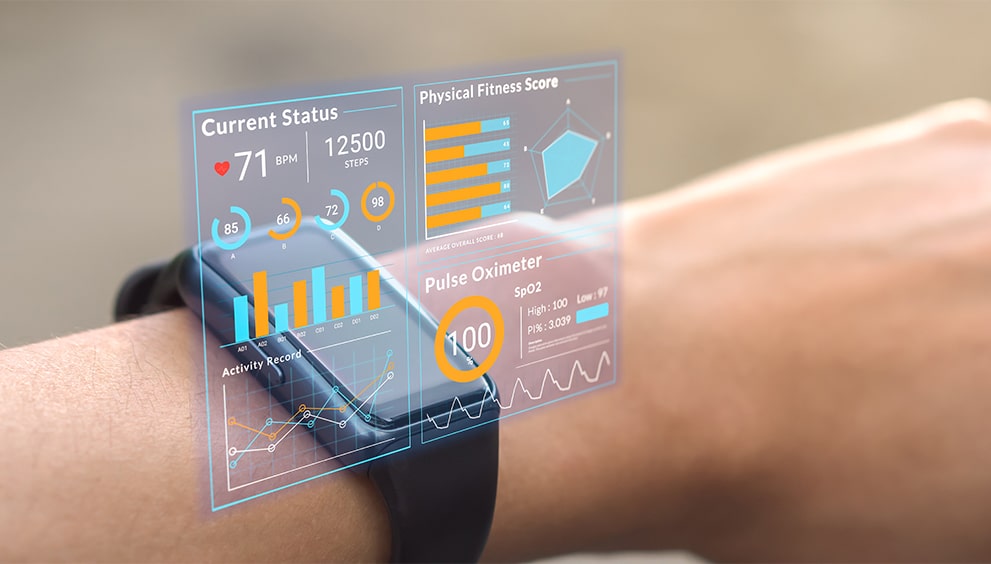Personalized Medicine: AI’s Role in Tailored Treatments


As part of “AI Revolutionizing MedTech: A Deep Dive,” we’ve explored AI’s role in healthcare infrastructure (Article 1), patient care and diagnostics (Article 2), and robotic surgery (Article 3). Now, we turn our focus to the critical area of personalized medicine, emphasizing its relevance to MedTech stakeholders, physicians, and hospital executives.
Artificial Intelligence is redefining the approach to personalized therapy selection, advancing well beyond genetic data to integrate a holistic view of patient health. Technology is increasingly becoming a key to managing chronic conditions, where treatment complexity often requires a highly individualized approach.
For instance, In heart disease management, AI systems meticulously analyze data from specific wearable devices, fostering a collaborative environment between patients, their devices, and healthcare providers.
Wearables like the Apple Watch, which tracks heart rate variability, and the Fitbit Charge, which monitors blood pressure, are not just passive data collectors. They are integral in providing real-time health insights.


For instance, a 58-year-old patient with congestive heart failure might use a Garmin Vivosmart for continuous heart rate monitoring and a Withings Blood Pressure Monitor for regular blood pressure readings.
These devices sync their data with a cloud-based AI system accessible to the patient’s healthcare team. This system flags anomalies and trends, like subtle changes in heart rate patterns or nocturnal blood pressure, alerting the care team to potential issues before they become critical. It enables healthcare providers to make timely interventions, such as adjusting medications or scheduling immediate consultations, significantly improving patient outcomes.
Similarly, devices like the Samsung Galaxy Watch, which tracks sleep patterns and activity levels, allow for preemptive healthcare measures in predicting atrial fibrillation. When these devices signal a potential health risk, they prompt a direct response from healthcare providers, who can then communicate with the patient to adjust treatment plans or lifestyle recommendations accordingly.
This interconnected system benefits all parties involved. Patients receive a more tailored and responsive healthcare experience, often leading to earlier interventions and better management of their conditions. Healthcare providers benefit from a continuous flow of data, which aids in more accurate and timely decision-making. And the AI system itself becomes increasingly effective as it learns from a growing dataset, further refining its predictive capabilities and recommendations. Ultimately, this synergy of AI, wearable technology, and proactive healthcare provider-patient interaction represents a significant leap forward in personalized medicine, improving care quality and patient quality of life.
Real-World Impact: Recent studies showcase AI’s effectiveness in diabetes management, where algorithms analyze blood sugar levels, dietary habits, and exercise patterns to optimize medication dosages, significantly improving patient outcomes. In oncology, AI’s role in personalizing chemotherapy regimens is groundbreaking. By examining tumor characteristics and patient genetics, AI suggests drug combinations with higher efficacy for specific cancer types, reducing exposure to ineffective treatments.
Patient Perspective: Patients increasingly benefit from AI-integrated treatments, leading to higher satisfaction rates. This improvement is largely due to more precise medication prescriptions made possible by AI’s ability to analyze extensive health data. AI empowers patients to be more involved in their care. Diabetic patients, for instance, use AI-powered glucose monitoring systems to make immediate lifestyle adjustments based on real-time data, fostering a greater sense of control over their condition.
This focus on patient-centered care is vital; it leads to higher adherence to care plans and improved health outcomes. By prioritizing patient experiences in AI-driven healthcare innovations, the industry not only boosts treatment effectiveness but also builds trust in new technologies, underscoring the significance of integrating AI in a responsive and beneficial way to patient needs.
Data Privacy and Ethical Considerations: As MedTech stakeholders integrate AI into healthcare, navigating data privacy and ethical considerations is paramount. Compliance with regulations like HIPAA in the US and GDPR in Europe is crucial, alongside developing clear policies for patient data usage and consent.
Healthcare providers and technology developers must prepare for potential changes in legal frameworks. As AI systems become more advanced and widespread, governments will introduce new regulations or amend existing ones to address the nuances of AI in healthcare better. It could include more specific guidelines on AI algorithm transparency, data-sharing agreements, and patient consent protocols.
In our next installment, “Medical Imaging Enhanced: Machine Vision’s Revolutionary Impact on Radiology,” we’ll examine AI’s transformative effects on medical imaging.
This article is part of the series “AI Revolutionizing MedTech: A Deep Dive” by The MedTech Digest. To gain a broader understanding of AI’s impact in healthcare and MedTech, please refer to our previous articles:
- Article 1: AI and Healthcare: A Transformative Partnership
- Article 2: From Diagnosis to Treatment: How AI Algorithms are Streamlining Patient Care
- Article 3: Robotic Surgery and AI: Precision, Efficiency, and the Future of Operations
We invite you to subscribe to The MedTech Digest to stay informed as we continue to explore the synergy between AI and Healthcare.













